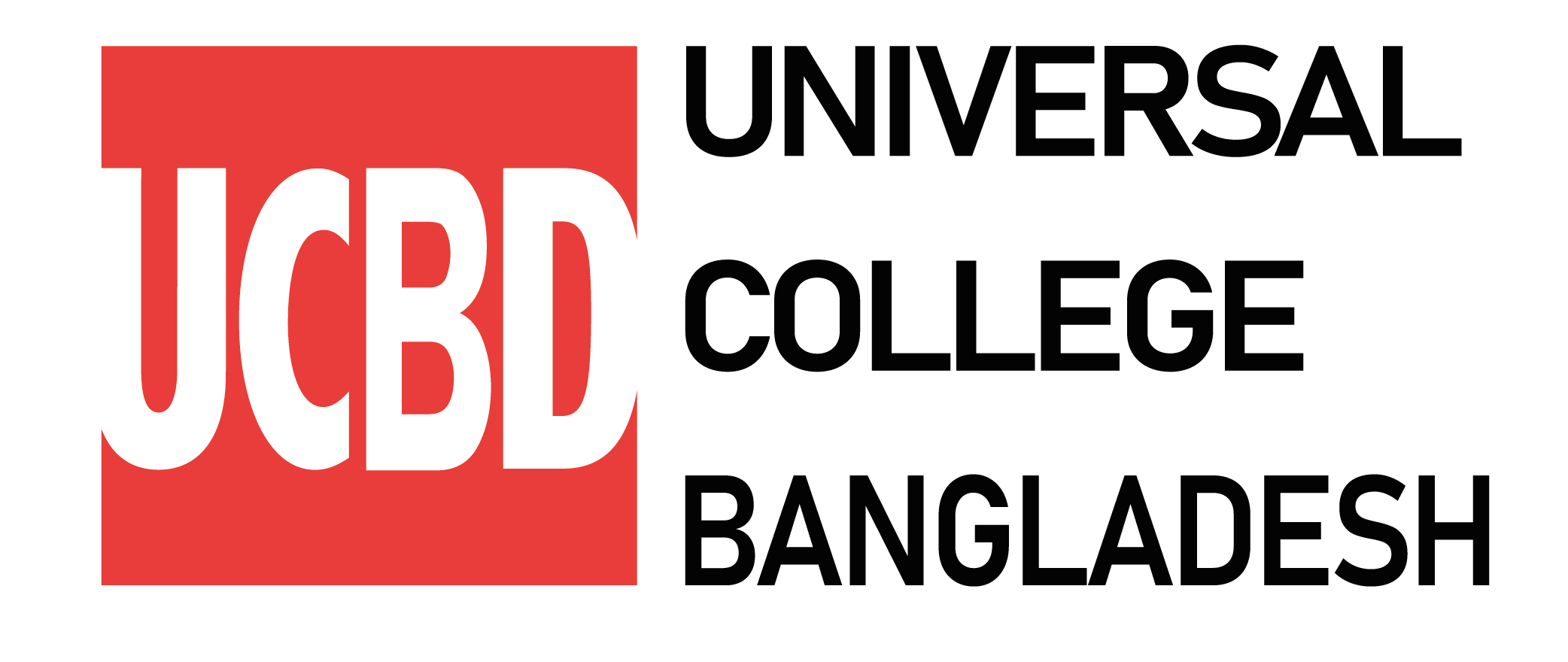UCBD turns global dreams into confident journeys

UCBD welcomes freshers to University of Lancashire UK Degree Programmes
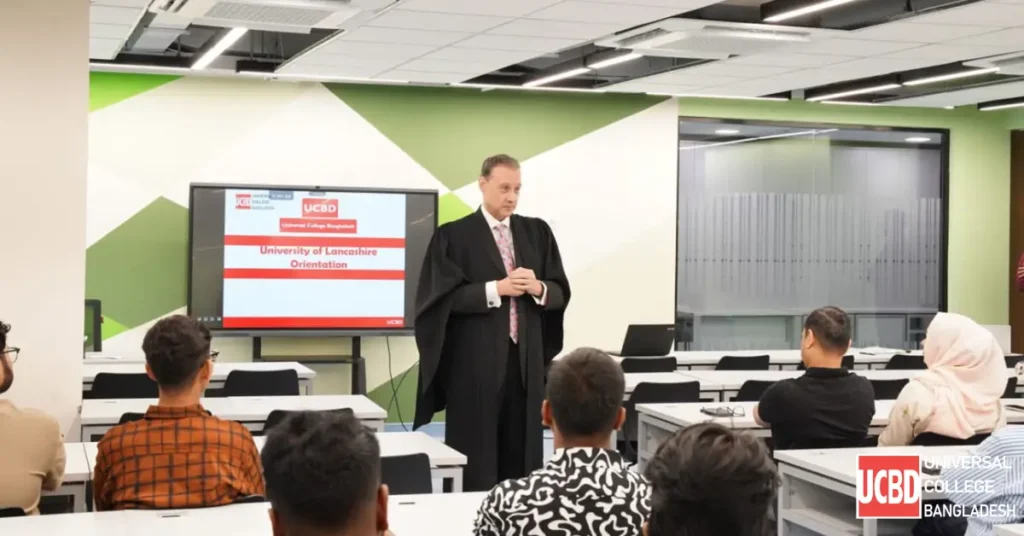
English Article: Universal College Bangladesh (UCBD) has welcomed the second batch of students enrolling in international business and information technology degree programmes offered by the University of Lancashire (ULan). The orientation, held on September 28 at UCBD’s Gulshan campus, introduced freshers and their parents to university life and the UK-accredited degrees available in Dhaka. “UCBD, the exclusive partner of ULan in Bangladesh, is the first higher education institution in the country to receive Ministry of Education approval to offer full international degrees. Students can complete their three-year honours programme in Dhaka or transfer to the UK after the first year”, says a press release. The event opened with remarks from Professor Muhammad Ismail Hossain, Dean of Academic Affairs, and Professor Hew Gill, President and Provost of UCBD. Addressing the students, Professor Gill said, “This is an excellent opportunity for local students to learn from our internationally acclaimed faculty members. The degrees offered here in Dhaka are exactly the same as those in the UK. In three years’ time, I look forward to presenting every student with a certificate proudly stating they have a degree from the University of Lancashire.” Ambreen Zaman, IT Programme Coordinator at UCBD, stressed the institution’s holistic approach, saying, “University isn’t just about academics; it’s about developing the whole person. This orientation introduces students and parents to the many resources available to help them thrive not only in their studies but also in life.” A Parents’ Orientation, led by Professor Gill and Samia Salam, Parent Engagement and Event Coordinator, was a key highlight. The session explained how ULan degrees open doors to career opportunities and postgraduate study. Programme-specific sessions followed, including presentations by UK faculty members involved in teaching and examining the ULan degrees in Bangladesh. Students were briefed on academic policies, expectations, support services, and campus life. A networking break midway through the day gave students, parents, faculty, and staff a chance to connect. The event closed with contributions from UCBD faculty and coordinators, reinforcing the college’s mission to build a well-informed, engaged, and supportive academic community from the outset of the year. Bangla Article: ইউনিভার্সিটি অব ল্যাঙ্কাশায়ারের (ইউএলএএন) ইন্টারন্যাশনাল বিজনেস ও ইনফরমেশন টেকনোলজি প্রোগ্রামে দ্বিতীয় ব্যাচের শিক্ষার্থীদের ওরিয়েন্টেশন অনুষ্ঠান আয়োজন করেছিল ইউনিভার্সাল কলেজ বাংলাদেশ (ইউসিবিডি)। গত রোববার (২৮ সেপ্টেম্বর) ইউসিবিডির গুলশান ক্যাম্পাসে এক অনুষ্ঠানে নবীন শিক্ষার্থী ও তাঁদের অভিভাবকদের স্বাগত জানানো হয়। অনুষ্ঠানে তাঁদের বিশ্ববিদ্যালয়ের শিক্ষাজীবন ও ইউসিবিডিতে যুক্তরাজ্যের ডিগ্রি সম্পর্কে সামগ্রিক ধারণা দেওয়া হয়। ইউএলএএন প্রোগ্রামের শিক্ষার্থীরা চাইলে ঢাকায় তিন বছরেই অনার্স সম্পন্ন করতে পারবেন কিংবা প্রথম বর্ষ শেষে তাদের জন্য যুক্তরাজ্যে স্থানান্তরের সুযোগও রয়েছে। অনুষ্ঠানের শুরুতে অতিথি ও শিক্ষার্থীদের উষ্ণ অভ্যর্থনা জানান ও উদ্বোধনী বক্তব্য দেন ইউসিবিডির ডিন অব একাডেমিক অ্যাফেয়ার্স অধ্যাপক মোহাম্মদ ইসমাইল হোসেন এবং ইউসিবিডির প্রেসিডেন্ট ও প্রভোস্ট অধ্যাপক হিউ গিল। শিক্ষার্থীরা ওরিয়েন্টেশনের অংশ হিসেবে ডিগ্রি-ভিত্তিক সেশনগুলোতে অংশ নেন, যেখানে প্রতিটি ডিগ্রি নিয়ে আলোচনা করা হয়। এসব সেশনে শিক্ষার্থীদের জন্য যুক্তরাজ্যের ফ্যাকাল্টি মেম্বাররা প্রেজেন্টেশন দেন। এই ফ্যাকাল্টি মেম্বাররা বাংলাদেশে ইউএলএএন ডিগ্রির অধীনে শিক্ষাদান ও মূল্যায়ন প্রক্রিয়ার সঙ্গেও সম্পৃক্ত। ওরিয়েন্টেশন প্রোগ্রামে শিক্ষার্থীরা একই সঙ্গে গুরুত্বপূর্ণ বিভিন্ন পলিসি, একাডেমিক প্রত্যাশা, শিক্ষার্থী সহায়তা সেবা এবং ক্যাম্পাস জীবন সম্পর্কেও জানার সুযোগ পান। Published In: TheDailyStar, Prothomalo, Tbsnews, Dhakamail, Thedhakatimes, Sangbadprotidin24, Protidinersangbad, Lekhaporabd, Newturn24, Newturn24, Thestatement24
From Dhaka to the World
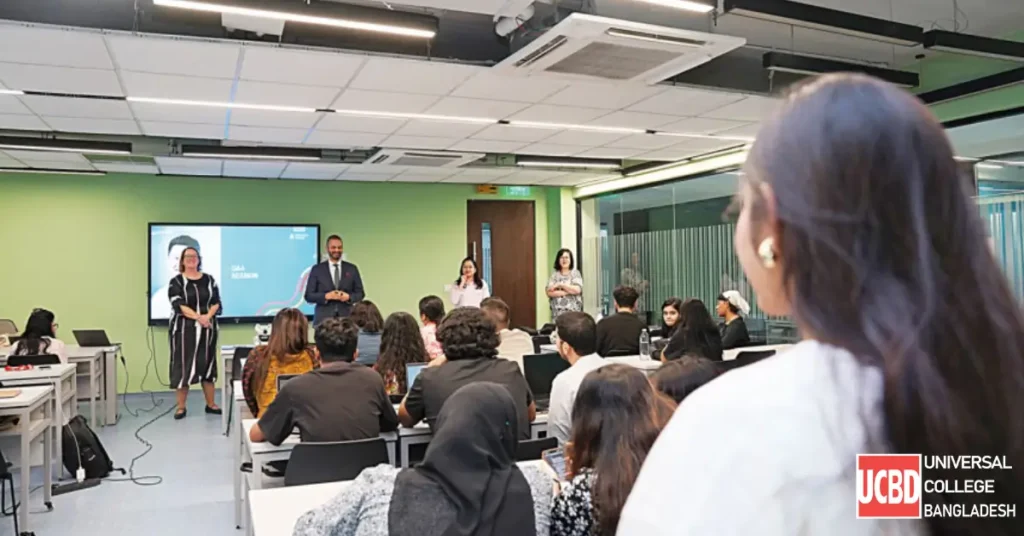
For many students finishing HSC or A Levels, the excitement of results is quickly followed by uncertainty. Should they choose public or private universities? Stay in Bangladesh or go abroad? What subject will best secure their future? These questions not only trouble students but also weigh heavily on their parents. Traditionally, the most ambitious students looked abroad. Yet today, studying overseas has become harder: admission competition is rising, scholarships are shrinking, visa policies are stricter, approvals are fewer, and costs for tuition and living continue to climb. Even part-time job opportunities abroad are less available than before. For many families, the dream of international education feels increasingly out of reach. Professor Hew Gill, President and Provost, Universal College Bangladesh (UCBD) That is where Universal College Bangladesh (UCBD) steps in. Created in partnership with some of the world’s leading universities, UCBD offers Bangladeshi students the chance to earn prestigious international degrees without leaving Dhaka. Direct Pathways Abroad UCBD collaborates with globally respected institutions, including the London School of Economics (LSE) under the University of London, University of Lancashire (UCLan), and Monash College in Australia. Through these partnerships, students gain access to internationally recognised programs with the same curriculums, exams, and faculty approval as their overseas counterparts. The Monash University Foundation Year (MUFY) provides a direct route to Monash University in Melbourne or Malaysia, guaranteeing admission for students who successfully complete the program. The UCBD International Foundation Year (UIFY) prepares SSC and O Level students for university study in the UK, US, Canada, and Australia. Meanwhile, the Monash College Diploma (MCD) fast-tracks AS, HSC, and MUFY graduates straight into the second year of Monash University degrees. This option saves time, reduces costs, and still leads to the same prestigious Monash qualifications. After HSC or A Levels, students often face tough choices: which university to join, what subject to study, whether to stay in Bangladesh or go abroad. Parents share the same worries, especially as tuition costs rise, visa policies tighten, and scholarships shrink. Studying abroad is still a dream for many, but with fewer part-time work opportunities and increasing expenses, the emotional and financial strain on families is greater than ever. International Degrees in Dhaka UCBD also delivers full University of London degrees under the academic direction of LSE. Programs include Accounting & Finance, Business & Management, Data Science & Business Analytics, Economics, and Finance. Students graduate with certificates identical to those earned in London, with UCBD listed only as the teaching centre. They even have the option to attend their graduation ceremony in the UK. In addition, UCLan offers UK-accredited degrees in Business & Marketing, Cyber Security, and Software Engineering at UCBD. These three-year programs can be completed entirely in Bangladesh or partly in the UK, with students receiving the exact same certificates as those in Britain. Stay Local, Go Global UCBD’s philosophy is simple: stay local, go global. Every program mirrors the standards of its international partner, from curriculum to assessment, while UCBD faculty undergo rigorous approval processes. Small-group teaching encourages engagement and confidence, and the cost is far more manageable for middle-income families compared to overseas study. Graduates leave with international credentials, global skills, and the confidence to succeed — whether in top Bangladeshi firms, multinational companies, or careers abroad. For current SSC, HSC, O and A Level students, UCBD represents a reliable gateway to world-class education and long-term opportunity. Published In: The Daily Star
UCBD offers country’s first international Cyber Security degree
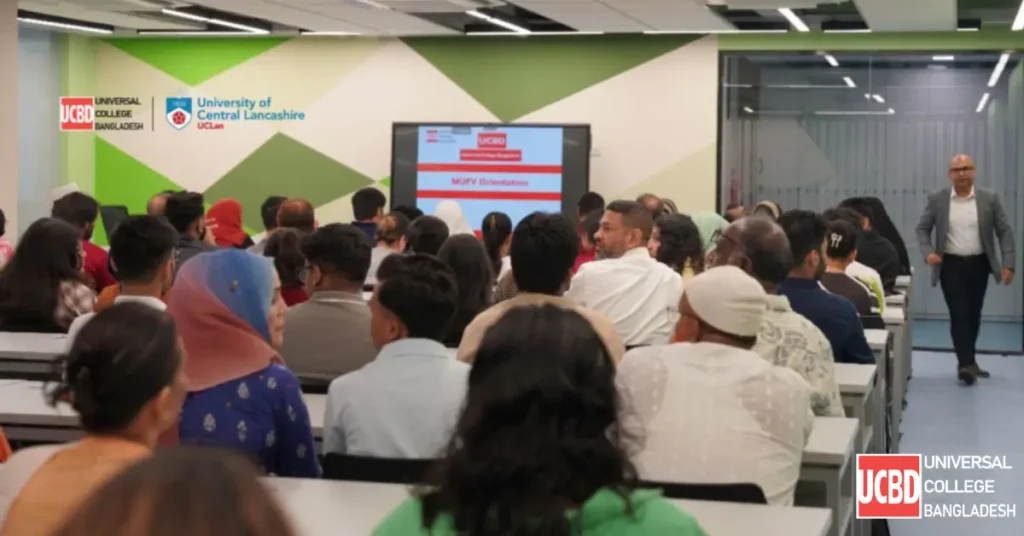
As business and government go digital, cyber security is one of the biggest issues worldwide. Over the last few years, we have seen some alarming incidents that have exposed just how vulnerable online systems are. From the compromise of the Smart NID database affecting over fifty million citizens to the January 2025 City Bank data breach, these incidents show how many organisations need experts to protect sensitive information. Millions of people’s personal data records are at risk, and the reality is clear – what Bangladesh needs now is more individuals skilled in cyber security and capable of safeguarding the country’s digital future. Cyber security is not only a concern for IT teams anymore. It’s a much broader issue that cuts across all facets of our lives, from financial security to national security. With our banking, healthcare, and government services online, the shortage of qualified cyber security professionals has become a national skill deficiency that nobody can ignore. Cyber attacks can come from anywhere in the world, and this means that cyber security is a global concern. This is why it is important for Bangladesh to educate its own cyber security specialists so the nation has its own pool of skilled professionals ready to face the international challenge. World-class cyber security professionals need world-class education facilities and affordable degree programmes. Universal College Bangladesh (UCBD) has partnered with the University of Lancashire (UCLan), UK, to bring international-standard cyber security education to Bangladesh. This year, UCBD introduced Bangladesh’s first international bachelor’s degree in Cyber Security. The degree takes three years and has the same syllabus as at UCLan in the UK. All lectures, practical sessions, and exams follow the same system as UCLan, which means that students in Dhaka get the same high-quality education and international accreditation as students in the UK. Students can complete the whole degree in Bangladesh, or choose to complete some of the programme in the UK. The degree accepts HSC and A level students from all streams, so it offers an easy and affordable pathway for individuals who want to establish careers in this rapidly expanding field. The UCBD-UCLan degree covers all the latest areas of cyber security, including ethical hacking, data protection, cyber law, and digital forensics. Every part of the programme is taught to international standards by faculty who are approved by UCLan, so students graduate with the latest skills to tackle real cyber security challenges. Cyber security professionals are becoming more in demand all around the world, and this UK degree offers job prospects for Bangladesh and internationally as well. The launch of a top international cyber security degree in Bangladesh has already started to make waves. Local students who want the value of an international degree but don’t want the hassle and costs of moving abroad are choosing UCBD. Alongside Cyber Security, UCBD is also offering UK degrees in Business & Marketing, Software Engineering, and other subjects for ambitious students who want to stay local and go global. In a time of increasing cyber attacks, the UCBD cyber security degree offers something more than an education. It allows Bangladeshi students to be the solution, to protect their country’s digital future, and prepare themselves for successful professional lives in their own country and globally – all without having to leave their home. Applications are now being accepted at UCBD for the September 2025 and January 2026 intakes of its UCLan degree programmes, including the Bachelor of Science degree in Cyber Security. Interested students can learn more about UCBD from their website and start a career in one of the world’s most in-demand industries. To learn more, visit: ucbd.edu.bd. Published In: The Daily Star
UCBD hosts orientation for Monash Foundation 2025 intake

English Article: Universal College Bangladesh (UCBD), the exclusive partner of Monash College in Australia, has held an orientation for the third batch of students in the Monash University Foundation Year (MUFY) programme. The event took place at UCBD’s Gulshan campus, where new students and their families were welcomed to the foundation course, which guarantees admission to Monash University in Australia or Monash Malaysia upon completion. Prof Muhammad Ismail Hossain, Dean of Academic Affairs at UCBD, delivered opening remarks, followed by Prof Hew Gill, President and Provost. Prof Gill said: “I would like to congratulate all our new students who are joining a guaranteed pathway to Monash University. Our results are better than Australia and our student enrolments are increasing because students and parents trust UCBD as the bridge to a truly international education at a world-class university.” Daniel Lum from International Recruitment and Development, Monash University Malaysia, and Azra Karim, Monash University Representative for Bangladesh, also spoke. Ms Karim said: “UCBD has the highest academic standards and a supportive learning environment that helps students grow in every way. UCBD excels in academic results consistently because of its excellent faculty team, and its international approach to teaching and learning. UCBD is a world-topping partner for success at Monash University and beyond.” Programme Coordinator and Senior Lecturer Ambreen Zaman outlined MUFY’s curriculum, while Deputy Registrar Shafik Waes explained academic policies and procedures. Student Support Head Ms Marzia Al-Hakeen described available services and activities, and IT Executive Mr Biplab Paul demonstrated the online learning systems. A parallel orientation for parents was led by Prof Gill and Parent Engagement Counsellor Ms Samia Salam, who highlighted MUFY programme options and study opportunities at Monash and other universities. UCBD, approved by the Ministry of Education as an international programme provider, offers pathways for students from O/AS/A/SSC/HSC backgrounds. Students can progress to Monash University or complete degrees from institutions including the University of London – London School of Economics and the University of Lancashire at UCBD’s Dhaka campus. Bangla Article: বাংলাদেশে অস্ট্রেলিয়ার মোনাশ কলেজের একমাত্র অনুমোদিত অংশীদার ইউনিভার্সাল কলেজ বাংলাদেশ (ইউসিবিডি) ২০২৫ -এর তৃতীয় ব্যাচের শিক্ষার্থীদের জন্য মোনাশ ইউনিভার্সিটি ফাউন্ডেশন ইয়ার (এমইউএফওয়াই) প্রোগ্রামের ওরিয়েন্টেশন আয়োজন করেছে। ইউসিবিডির গুলশান ক্যাম্পাসে অনুষ্ঠানটির এ আয়োজনে নতুন শিক্ষার্থী ও তাদের অভিভাবকদের স্বাগত জানানো হয়। এমইউএফওয়াই আন্তর্জাতিকভাবে স্বীকৃত একটি ফাউন্ডেশন প্রোগ্রাম। সফলভাবে এ প্রোগ্রাম সম্পন্ন করার পরে শিক্ষার্থীরা অস্ট্রেলিয়া কিংবা মালয়েশিয়ার মোনাশ ইউনিভার্সিটিতে ভর্তি হওয়ার সুযোগ পান। ইউসিবিডির অ্যাকাডেমিক অ্যাফেয়ার্সের ডিন অধ্যাপক মোহাম্মদ ইসমাইল হোসেনের স্বাগত বক্তব্য দিয়ে ওরিয়েন্টেশন প্রোগ্রাম শুরু হয়। এরপর ইউসিবিডির প্রেসিডেন্ট ও প্রোভোস্ট অধ্যাপক হিউ গিল বক্তব্য রাখেন। তিনি বলেন, “আমি আমাদের নতুন শিক্ষার্থীদের অভিনন্দন জানাতে চাই, তারা মোনাশ ইউনিভার্সিটিতে যাওয়ার নিশ্চিত পথে অগ্রসর হয়েছে। বাংলাদেশে আমাদের শিক্ষার্থীদের ফলাফল অস্ট্রেলিয়ার চেয়েও ভালো। আমাদের এখানে শিক্ষার্থীদের ভর্তি দিন দিন বাড়ছে। এখন শিক্ষার্থী ও অভিভাবকেরা ইউসিবিডির ওপর আ¯’া রাখেন কারণ, তারা ইউসিবিডিকে আন্তর্জাতিকমানের শিক্ষা গ্রহণে বিশ্বমানের বিশ্ববিদ্যালয়ের সাথে সেতুবন্ধন হিসেবে মনে করেন। এছাড়াও, অনুষ্ঠানে নিজেদের মতামত তুলে ধরেন মালয়েশিয়ার মোনাশ ইউনিভার্সিটির ইন্টারন্যাশনাল রিক্রুটমেন্ট অ্যান্ড ডেভেলপমেন্ট বিভাগের ড্যানিয়েল লাম এবং বাংলাদেশে মোনাশ ইউনিভার্সিটির প্রতিনিধি আজরা করিম। অনুষ্ঠানে আজরা করিম বলেন, “ইউসিবিডি সবসময় সর্বো”চ অ্যাকাডেমিক মান বজায় রাখে। এখানকার শিক্ষা-সহায়ক পরিবেশ শিক্ষার্থীদের সামগ্রিকভাবে উন্নয়নে সহায়তা করে। ইউসিবিডি ধারাবাহিকভাবে দুর্দান্ত ফলাফল করে আসছে, আর এর পেছনে রয়েছে অভিজ্ঞ শিক্ষকগণ এবং আন্তর্জাতিক কারিকুলামে শিক্ষাদান পদ্ধতি। শিক্ষার্থীদের সফলতার পথে মোনাশ ইউনিভার্সিটির বিশ্বমানের অংশীদার ইউসিবিডি।” এ প্রোগ্রামের কো-অর্ডিনেটর ও সিনিয়র লেকচারার আমব্রিন জামান ‘এমইউএফওয়াই’ প্রোগ্রামের পাঠ্যক্রম এবং ‘কনটিনিউয়াস অ্যাসেসমেন্ট’ পদ্ধতি ব্যাখ্যা করেন। ‘কনটিনিউয়াস অ্যাসেসমেন্ট’ পদ্ধতিতে শিক্ষার্থীদের গতানুগতিক ফাইনাল পরীক্ষা দিতে হয় না, তার বদলে পুরো সেমিস্টার জুড়ে বিভিন্ন ভাগে পরীক্ষা নেয়া হয়। ইউসিবিডির ডেপুটি রেজিস্ট্রার শফিক ওয়ায়েস অ্যাকাডেমিক নীতিমালা ও প্রক্রিয়া ব্যাখ্যা করেন। স্টুডেন্ট সাপোর্ট প্রধান মার্জিয়া আল-হাকিন শিক্ষার্থীদের জন্য থাকা বিভিন্ন সহায়তা ও কার্যক্রম নিয়ে কথা বলেন। এছাড়াও, আইটি এক্সিকিউটিভ বিপ্লব পাল শিক্ষার্থীদের অনলাইনে পড়াশোনার পদ্ধতি ও মোনাশ কর্তৃক সরবরাহকৃত বিভিন্ন লার্নিং মেটেরিয়াল কীভাবে ব্যবহার করতে হবে, তা দেখান। অনুষ্ঠানে শিক্ষার্থীদের পাশাপাশি অভিভাবকদের জন্যও একটি আলাদা ওরিয়েন্টেশন সেশন আয়োজন করা হয়। এ সেশন পরিচালনা করেন অধ্যাপক হিউ গিল ও প্যারেন্ট এনগেজমেন্ট কাউন্সিলর সামিয়া সালাম। অভিভাবকেরা ‘এমইউএফওয়াই’ প্রোগ্রাম সম্পর্কে একটি পরিষ্কার ধারণা পান এবং এই প্রোগ্রাম শেষে শিক্ষার্থীরা কীভাবে মোনাশসহ বিশ্বের বিভিন্ন শীর্ষ¯’ানীয় বিশ্ববিদ্যালয়ে পড়াশোনা করতে পারবে, সে সম্পর্কেও বিস্তারিত জানতে পারেন। ইউসিবিডি বাংলাদেশে আন্তর্জাতিক প্রোগ্রামের প্রতিষ্ঠান হিসেবে শিক্ষা মন্ত্রণালয় অনুমোদিত প্রথম প্রতিষ্ঠান। ও/এ এস/ এ/ এস এস সি/ এইচ এস সি পাশ করা শিক্ষার্থীরা এখান থেকেই মোনাশ ইউনিভার্সিটি কিংবা বিশ্বের শীর্ষ¯’ানীয় বিশ্ববিদ্যালয়ে ভর্তি হতে পারবেন। লন্ডন স্কুল অব ইকনোমিকস এবং ইউনিভার্সিটি অব ল্যাঙ্কাশায়ার এর আন্তর্জাতিক ডিগ্রি নিজ দেশে ঢাকার ইউসিবিডি ক্যাম্পাস থেকেই সম্পন্ন করতে পারবেন। Published In: TheDailyStar, Tbsnews, Prothomalo, Newagebd, Jugantor, Sharebazarnews, Natun-barta, Thedhakacrimenews, Gramnagarbarta, Greenwatchbd, Dailycapitalviews
Shaping the Future with Data: Global Trends & Bangladesh’s Path
On August 17, 2025, we were honored to welcome Dr. James Abdey, Associate Professor of Statistics & Associate Academic Director of the EMFSS Programmes at the London School of Economics and Political Science (LSE), to UCBD’s Gulshan-1 campus in Dhaka! He was warmly received by Prof. Hew Gill, President & Provost of UCBD, and Mr. Kingshuk Gupta, COO of UCBD. We were also delighted to have Mr. Sumit Saha—Co-founder & Managing Director of Analyzen, and Founder & CEO of Learn with Sumit—join us as a special guest. Together, Dr. Abdey and Mr. Saha shared their insights during an inspiring session on: “Shaping the Future with Data: Global Trends & Bangladesh’s Path” — sparking important conversations around the future of Data Science and the opportunities it holds for the youth of Bangladesh.
From Chattogram to the world: UCBD’s role in shaping global futures

Sometimes, all it takes to achieve real success in life is the courage to step out of your comfort zone. For many students, that step begins with a decision that challenges the traditional route and opens new possibilities. For Mashrur and Bareerah, who are both from Chattogram, that decision took them to Universal College Bangladesh (UCBD), which has become a trusted education partner for Bangladeshi students to launch their global academic journeys. Instead of the traditional A Level or SAT route, both students chose UCBD, where internationally recognised foundation and diploma programmes are offered in partnership with Monash University. Today, Mashrur and Bareerah’s stories are powerful examples of how ambition, guidance, and the right educational choice can change your future. Bareerah Al Manha Begh Finding UCBD Mashrur, a former student of CIDER International School, first heard about UCBD from a senior. “I was surprised when I learned that an institution in Dhaka was offering Monash University Foundation Year (MUFY). I always thought these were only available overseas,” said Mashrur. He added, “At first, I was a little sceptical. But after doing some research and learning that many of my peers had actually gone abroad from UCBD, I realised that it’s a genuine, government-authorised higher education institution.” Mashrur joined UCBD right after his O Levels. The prospect of completing his foundation locally while still opening up pathways to international universities sealed the deal for him. Mashrur successfully completed his foundation, and when he considered the convenience and low cost of completing an international degree in Dhaka, he opted to do a three-year University of Lancashire Business and Marketing degree at UCBD. For Bareerah Al Manha Begh, who is from Chittagong Grammar School (CGS), UCBD offered a perfect pathway to an international education. She initially joined UCBD because her family wanted to keep her close while she prepared to study overseas. She said, “I had always wanted to study in Australia. But I was young, and it made my parents comfortable and happy to keep me close for a bit longer. UCBD gave me the option to complete my foundation and then the first year of my Monash University degree in Bangladesh. It was amazing to get the same high-quality Monash education while still being at home, and it made the transition to university cheaper and easier for me.” A Monash student from day one When Mashrur and Bareerah enrolled in the Monash University foundation and continuing degree programmes, they were Monash students from day one. Bareerah shared, “At UCBD, we use exactly the same online learning resources and materials as Monash students in Australia. The curriculum is also the same, and the teaching style is the same because all the lecturers are Monash-approved and use the Monash method. Studying at UCBD is like being in Australia!” UCBD students have a head start because they are already familiar with international standards and methods of teaching and learning. This makes their academic transition to an overseas university much smoother and gives them the confidence they need to plan their next steps. Mashrur Mahmud Khan Academic and emotional support Bareerah and Mashrur believe that what sets UCBD apart is not only the academic rigour, but also the strong support system it offers to students. “The lecturers are always available, even outside formal lecture times, and they are always ready to help and advise. When I had a family emergency, the Student Support team helped me take some time off, and my lecturers worked out a new study plan so I could complete my courses and exams on time,” said Mashrur. Bareerah pointed out that UCBD was really helpful when she decided to switch from science to business studies. She said, “When I decided to make the change, all my lecturers helped me, and sometimes, I relied on them emotionally rather than my peers.” Beyond the classroom UCBD also helped the students to grow outside the classroom. Bareerah talked about how she used to be quite shy but became more outgoing and confident through getting involved in student activities and organising events. “I met people from all over the country, and made some great friends. UCBD helped me develop my leadership and communication skills, and all my contributions were recognised with certificates presented to me by Professor Hew Gill, President of UCBD,” she said. Mashrur too found his stride in Dhaka. He shared, “Before UCBD, I had been part of small events in Chattogram. But after coming to UCBD, I got to work with big names like Let’s Viber and Tyger Media. I even helped with the Arka Fashion Week and an Atif Aslam concert. The network and visibility I gained at UCBD changed everything.”. Looking ahead Mashrur is now completing his UK degree at UCBD, while Bareerah is preparing to move to Monash University in Australia. As they prepare for the next chapters of their lives, they credit UCBD for helping them find purpose, for building their confidence, and for showing them how to study local and think global. Stories like those of Mashrur and Bareerah send a powerful message: Global success doesn’t always begin with a plane ticket; it can start right here at home, with the right guidance, grit, and a place like UCBD. Published In: The Daily Star
UCBD holds orientation for the second 2025 batch of Monash students
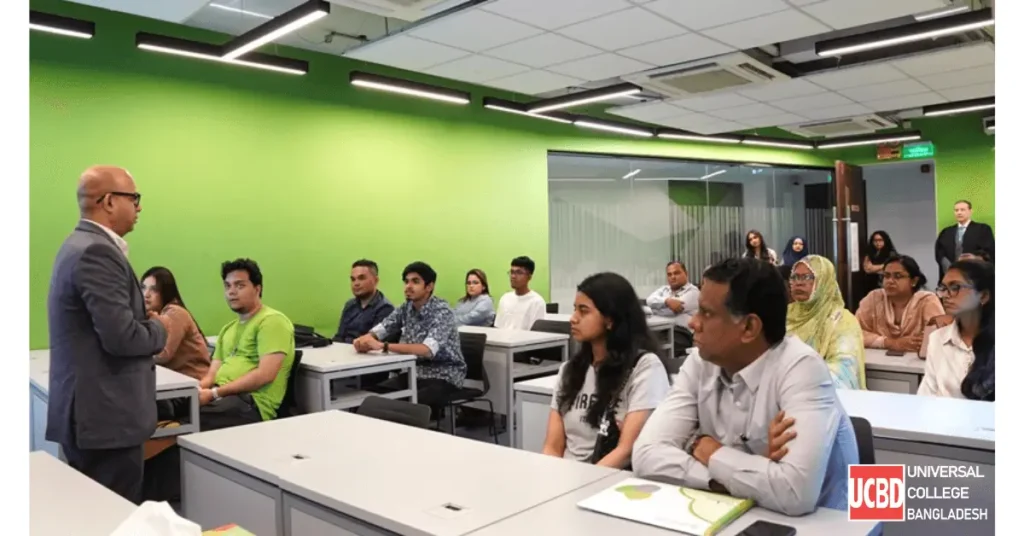
Universal College Bangladesh (UCBD), the exclusive partner of Monash College, Australia in Bangladesh, successfully concluded the orientation program for the Monash University Foundation Year (MUFY) program. This has been the second batch of 2025, following the successful orientation of the first intake held in January 2025. The Monash Foundation Year is a comprehensive program that guarantees students a place to study for their degree at Monash University Australia or Monash Malaysia, according to a press release. The orientation session kicked off with opening remarks from Professor Muhammad Ismail Hossain, Dean of Academic Affairs at UCBD, who is himself a Monash alumnus. Following this, Professor Hew Gill, President & Provost at UCBD, addressed the incoming cohort and their parents: “UCBD MUFY results in Dhaka are the best in the world, even better than Monash results in Australia. MUFY offers a guaranteed pathway to a world top 40 university for every student who passes, and all our UCBD students pass. This is why our enrolments are growing and why more local students are coming forward to pursue their dreams of world-class education, here in Bangladesh,” he said. Speaking about the program, Azra Karim, Country Representative in Bangladesh, International Student Recruitment (ISR), Admission and Communication, Monash University, said, “As you sign up for the Foundation Year program, you become a part of the Monash global community from day one. It is an excellent opportunity to start your journey right here in Bangladesh with full academic support.” Ambreen Zaman, Sr. Lecturer & MUFY Program Coordinator, gave the students and parents a program overview session in which she thoroughly explained the cutting-edge curriculum and the model of continuous assessment that Monash uses instead of high stakes final exams. Other members of the academic faculty and support team explained important aspects of the MUFY program, and introduced the students to the online systems and resources that are used to support teaching and learning. Prof Hew and Samia Salam, Parent Engagement Executive, conducted a special briefing session for parents about how they can support their children to study, and the many international degree choices for UCBD students after MUFY. UCBD is the exclusive partner of Monash College, Australia, and is the 1st Ministry of Education-approved international education provider in Bangladesh. Students can jumpstart their journey to a degree at Monash University, University of London – London School of Economics, University of Lancashire and other global universities immediately after their O/AS/A/HSC levels by joining international programs right here in Bangladesh at UCBD. The UCBD Gulshan campus offers students the opportunity to complete full international degrees, but pay locally competitive fees. To know more about UCBD programs visit – https://ucbd.edu.bd/ Published In: Dailycapitalviews
২০২৫ সালে দ্বিতীয় ব্যাচের মোনাশ শিক্ষার্থীদের জন্য ইউসিবিডি’র ওরিয়েন্টেশন অনুষ্ঠিত

বাংলাদেশে অস্ট্রেলিয়ার মোনাশ কলেজের একমাত্র অংশীদার ইউনিভার্সাল কলেজ বাংলাদেশ (ইউসিবিডি) মোনাশ ইউনিভার্সিটি ফাউন্ডেশন ইয়ার (এমিউএফওয়াই) প্রোগ্রামের ওরিয়েন্টেশন সম্পন্ন করেছে। এর মাধ্যমে চলতি বছর ইউসিবিডি’র মোনাশ শিক্ষার্থীদের দ্বিতীয় ব্যাচের যাত্রা শুরু হয়। মোনাশ ফউন্ডেশন ইয়ার প্রোগ্রামের মাধ্যমে শিক্ষার্থীরা অস্ট্রেলিয়া কিংবা মালয়েশিয়ার মোনাশ ইউনিভার্সিটিতে উচ্চশিক্ষা গ্রহণের নিশ্চিত সুযোগ লাভ করে। ইউসিবিডির অ্যাকাডেমিক অ্যাফেয়ার্সের ডিন ও মোনাশ ইউনিভার্সিটির প্রাক্তন শিক্ষার্থী অধ্যাপক মুহাম্মদ ইসমাইল হোসেনের স্বাগত বক্তব্যের মাধ্যমে ওরিয়েন্টশন অনুষ্ঠান শুরু হয়। এরপর ইউসিবিডির প্রেসিডেন্ট এবং প্রভোস্ট শিক্ষার্থী ও অভিভাবকদের উদ্দেশ্যে বক্তব্য রাখেন। তিনি বলেন, “ঢাকায় ইউসিবিডির এমিউএফওয়াই এর ফলাফল বিশ্বসেরা , এমনকি অস্ট্রেলিয়ার মোনাশের থেকেও ভালো। যারা এই প্রোগ্রাম সফলভাবে শেষ করতে পারে, তারা প্রত্যেকেই নিশ্চিতভাবে বিশ্বের শীর্ষ ৪০ বিশ্ববিদ্যালয়ে পড়ার সুযোগ পায়। আর আমাদের সকল শিক্ষার্থীই সফলতার সাথে উত্তীর্ণ হয়। এ কারণেই আমাদের এখানে ভর্তির সংখ্যা দিন দিন বাড়ছে এবং বাংলাদেশের আরও অনেক শিক্ষার্থী বিশ্বমানের শিক্ষার্জনের স্বপ্নপুরণে ইউসিবিডি-তে ।” এ প্রোগ্রামটি সম্পর্কে মোনাশ ইউনিভার্সিটির অ্যাডমিশন অ্যান্ড কমিউনিকেশন বিভাগের ইন্টারন্যাশনাল স্টুডেন্ট রিক্রুটমেন্টের (আইএসআর) বাংলাদেশের রিপ্রেজেন্টেটিভ আজরা করিম বলেন, “এ ফাউন্ডেশন ইয়ার প্রোগ্রামে ভর্তি হওয়ার প্রথম দিন থেকেই প্রত্যেক শিক্ষার্থী মোনাশের গ্লোবাল কমিউনিটির অংশ হয়ে যায়। পূর্ণ অ্যাকাডেমিক সহযোগিতার মাধ্যমে বাংলাদেশ থেকেই উচ্চশিক্ষার এই যাত্রা শুরু করা যেকোনো শিক্ষার্থীর জন্যই এটি একটি দুর্দান্ত সুযোগ।” এমইউএফওয়াই প্রোগ্রামের সিনিয়র লেকচারার ও কো-অর্ডিনেটর আমব্রিন জামান অনুষ্ঠানে শিক্ষার্থী ও অভিভাবকদের প্রোগ্রামটি সম্পর্কে একটি বিস্তারিত ধারণা দেন। তিনি মোনাশ কারিকুলামে গতানুগতিক বড় আকারের ফাইনাল পরীক্ষার বদলে যে ধারাবাহিক মূল্যায়ন পদ্ধতি অনুসরণ করা হয়, তা ব্যাখ্যা করেন। এছাড়াও, ইউসিবিডির অন্যান্য অ্যাকাডেমিক ও সাপোর্ট টিমের সদস্যেরা এমইউএফওয়াই প্রোগ্রামের বিভিন্ন গুরুত্বপূর্ণ বিষয় এবং প্রোগ্রামে ব্যবহৃত অনলাইন সিস্টেম ও পড়াশোনার ক্ষেত্রে কাজে দিবে এমন উপকরণ সমূহ কীভাবে সহজে পেতে পারে, তা নিয়ে শিক্ষার্থীদের ধারণা দেন। প্রফেসর হিউ গিল এবং প্যারেন্ট এনগেজমেন্ট এক্সিকিউটিভ সামিয়া সালাম অভিভাবকদের জন্য একটি বিশেষ ব্রিফিং সেশন পরিচালনা করেন। অভিভাবকেরা কীভাবে তাদের সন্তানদের উচ্চশিক্ষার সহায়তা করতে পারেন, তা নিয়ে সেশনে আলোচনা করেন তিনি। এছাড়াও, এমইউএফওয়াই শেষ করার পরে অনেকগুলো আন্তর্জাতিক বিষয়ের মধ্য থেকে উচ্চশিক্ষা অর্জনে সঠিক ডিগ্রিটি বেছে নেয়ার মত গুরুত্বপূর্ণ বিষয়েও আলোকপাত করেন তিনি। ইউসিবিডি বাংলাদেশের শিক্ষা মন্ত্রণালয় অনুমোদিত প্রথম আন্তর্জাতিক শিক্ষাপ্রতিষ্ঠান এবং অস্ট্রেলিয়ার মোনাশ কলেজের একমাত্র অনুমোদিত অংশীদার। এখানকার শিক্ষার্থীরা ও/ এএস/এ/এ/এইচএসসি লেভেল শেষ করে মোনাশ ইউনিভার্সিটি, লন্ডন স্কুল অব ইকোনমিকস (ইউনিভার্সিটি অব লন্ডন) ও ইউনিভার্সিটি অব ল্যাঙ্কাশায়ারসহ বিশ্বের অন্যান্য শীর্ষস্থানীয় বিশ্ববিদ্যালয়ে তাদের উচ্চশিক্ষার যাত্রা ইউসিবিডি থেকে বাংলাদেশে বসেই শুরু করতে পারেন। উল্লেখ্য, ইউসিবিডির গুলশান ক্যাম্পাসে রয়েছে দেশে থেকেই আন্তর্জাতিক ডিগ্রি অর্জনের সুযোগ, তবে খরচ হবে দেশের অন্যান্য শিক্ষা প্রতিষ্ঠানের সাথে সামঞ্জস্য রেখেই। Published In: Natun-barta
২০২৫ সালে দ্বিতীয় ব্যাচের মোনাশ শিক্ষার্থীদের জন্য ইউসিবিডি’র ওরিয়েন্টেশন অনুষ্ঠিত

বাংলাদেশে অস্ট্রেলিয়ার মোনাশ কলেজের একমাত্র অংশীদার ইউনিভার্সাল কলেজ বাংলাদেশ (ইউসিবিডি) মোনাশ ইউনিভার্সিটি ফাউন্ডেশন ইয়ার (এমিউএফওয়াই) প্রোগ্রামের ওরিয়েন্টেশন সম্পন্ন করেছে। এর মাধ্যমে চলতি বছর ইউসিবিডি’র মোনাশ শিক্ষার্থীদের দ্বিতীয় ব্যাচের যাত্রা শুরু হয়। মোনাশ ফউন্ডেশন ইয়ার প্রোগ্রামের মাধ্যমে শিক্ষার্থীরা অস্ট্রেলিয়া কিংবা মালয়েশিয়ার মোনাশ ইউনিভার্সিটিতে উচ্চশিক্ষা গ্রহণের নিশ্চিত সুযোগ লাভ করে। ইউসিবিডির অ্যাকাডেমিক অ্যাফেয়ার্সের ডিন ও মোনাশ ইউনিভার্সিটির প্রাক্তন শিক্ষার্থী অধ্যাপক মুহাম্মদ ইসমাইল হোসেনের স্বাগত বক্তব্যের মাধ্যমে ওরিয়েন্টশন অনুষ্ঠান শুরু হয়। এরপর ইউসিবিডির প্রেসিডেন্ট এবং প্রভোস্ট শিক্ষার্থী ও অভিভাবকদের উদ্দেশ্যে বক্তব্য রাখেন। তিনি বলেন, ঢাকায় ইউসিবিডির এমিউএফওয়াই এর ফলাফল বিশ্বসেরা, এমনকি অস্ট্রেলিয়ার মোনাশের থেকেও ভালো। যারা এই প্রোগ্রাম সফলভাবে শেষ করতে পারে, তারা প্রত্যেকেই নিশ্চিতভাবে বিশ্বের শীর্ষ ৪০ বিশ্ববিদ্যালয়ে পড়ার সুযোগ পায়। আর আমাদের সকল শিক্ষার্থীই সফলতার সাথে উত্তীর্ণ হয়। এ কারণেই আমাদের এখানে ভর্তির সংখ্যা দিন দিন বাড়ছে এবং বাংলাদেশের আরও অনেক শিক্ষার্থী বিশ্বমানের শিক্ষার্জনের স্বপ্নপুরণে ইউসিবিডি-তে । এ প্রোগ্রামটি সম্পর্কে মোনাশ ইউনিভার্সিটির অ্যাডমিশন অ্যান্ড কমিউনিকেশন বিভাগের ইন্টারন্যাশনাল স্টুডেন্ট রিক্রুটমেন্টের (আইএসআর) বাংলাদেশের রিপ্রেজেন্টেটিভ আজরা করিম বলেন, এ ফাউন্ডেশন ইয়ার প্রোগ্রামে ভর্তি হওয়ার প্রথম দিন থেকেই প্রত্যেক শিক্ষার্থী মোনাশের গ্লোবাল কমিউনিটির অংশ হয়ে যায়। পূর্ণ অ্যাকাডেমিক সহযোগিতার মাধ্যমে বাংলাদেশ থেকেই উচ্চশিক্ষার এই যাত্রা শুরু করা যেকোনো শিক্ষার্থীর জন্যই এটি একটি দুর্দান্ত সুযোগ।” এমইউএফওয়াই প্রোগ্রামের সিনিয়র লেকচারার ও কো-অর্ডিনেটর আমব্রিন জামান অনুষ্ঠানে শিক্ষার্থী ও অভিভাবকদের প্রোগ্রামটি সম্পর্কে একটি বিস্তারিত ধারণা দেন। তিনি মোনাশ কারিকুলামে গতানুগতিক বড় আকারের ফাইনাল পরীক্ষার বদলে যে ধারাবাহিক মূল্যায়ন পদ্ধতি অনুসরণ করা হয়, তা ব্যাখ্যা করেন। এছাড়াও, ইউসিবিডির অন্যান্য অ্যাকাডেমিক ও সাপোর্ট টিমের সদস্যেরা এমইউএফওয়াই প্রোগ্রামের বিভিন্ন গুরুত্বপূর্ণ বিষয় এবং প্রোগ্রামে ব্যবহৃত অনলাইন সিস্টেম ও পড়াশোনার ক্ষেত্রে কাজে দিবে এমন উপকরণ সমূহ কীভাবে সহজে পেতে পারে, তা নিয়ে শিক্ষার্থীদের ধারণা দেন। প্রফেসর হিউ গিল এবং প্যারেন্ট এনগেজমেন্ট এক্সিকিউটিভ সামিয়া সালাম অভিভাবকদের জন্য একটি বিশেষ ব্রিফিং সেশন পরিচালনা করেন। অভিভাবকেরা কীভাবে তাদের সন্তানদের উচ্চশিক্ষার সহায়তা করতে পারেন, তা নিয়ে সেশনে আলোচনা করেন তিনি। এছাড়াও, এমইউএফওয়াই শেষ করার পরে অনেকগুলো আন্তর্জাতিক বিষয়ের মধ্য থেকে উচ্চশিক্ষা অর্জনে সঠিক ডিগ্রিটি বেছে নেয়ার মত গুরুত্বপূর্ণ বিষয়েও আলোকপাত করেন তিনি। ইউসিবিডি বাংলাদেশের শিক্ষা মন্ত্রণালয় অনুমোদিত প্রথম আন্তর্জাতিক শিক্ষাপ্রতিষ্ঠান এবং অস্ট্রেলিয়ার মোনাশ কলেজের একমাত্র অনুমোদিত অংশীদার। এখানকার শিক্ষার্থীরা ও/ এএস/এ/এ/এইচএসসি লেভেল শেষ করে মোনাশ ইউনিভার্সিটি, লন্ডন স্কুল অব ইকোনমিকস (ইউনিভার্সিটি অব লন্ডন) ও ইউনিভার্সিটি অব ল্যাঙ্কাশায়ারসহ বিশ্বের অন্যান্য শীর্ষস্থানীয় বিশ্ববিদ্যালয়ে তাদের উচ্চশিক্ষার যাত্রা ইউসিবিডি থেকে বাংলাদেশে বসেই শুরু করতে পারেন। উল্লেখ্য, ইউসিবিডির গুলশান ক্যাম্পাসে রয়েছে দেশে থেকেই আন্তর্জাতিক ডিগ্রি অর্জনের সুযোগ, তবে খরচ হবে দেশের অন্যান্য শিক্ষা প্রতিষ্ঠানের সাথে সামঞ্জস্য রেখেই। Published In: Notunshomoy
